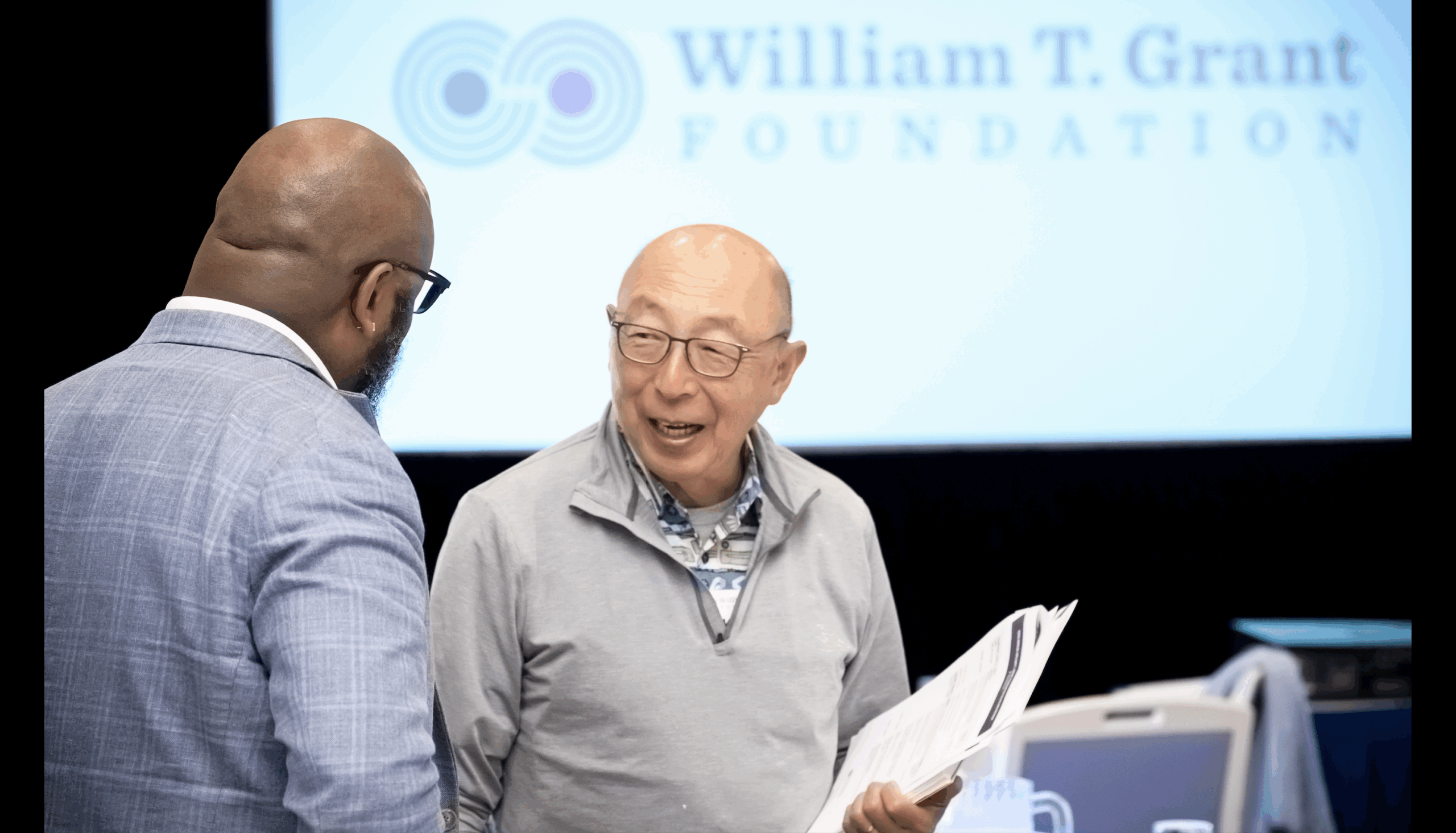The Foundation is pleased to announce that four research grantees have been awarded grants to support their development as mentors to junior researchers of color. The awardees will mentor promising doctoral students and post-doctoral fellows in enhancing their methodological skills, publication records, and career networks.
The mentoring grants program is designed to help William T. Grant Scholars and research grantees hone their skills and abilities as mentors and help researchers of color reach higher levels on the career ladder. The award encourages grantees to be strong mentors attuned to the career development challenges disproportionately faced by their junior colleagues of color.
Applicants to the program assess their current strengths and weaknesses as mentors and propose goals for improving their mentoring skills. They and their mentees also assess the mentees’ strengths and weaknesses and design a mentoring plan that will strengthen the mentees’ potential for a successful research career.
This year’s mentoring grantees are:
Kimberly Becker, University of South Carolina
Kimberly Becker is a research grantee studying the use of research evidence in mental health. She has mentored three postdoctoral fellows, fourteen graduate students, and more than thirty undergraduate students, and has helped students win grant funding, serve as lead authors and co-authors on peer-reviewed publications, and present at conferences. While 50% of the graduate students and 75% of the undergraduate students in her research lab are people of color, Becker states that she has not reflected thoroughly on her positionality as a White middle-class woman and how it affects her mentoring relationships, nor has she fully explored the experiences of junior scholars of color. Becker’s mentee is Wendy Chu, a Chinese American doctoral student at the University of South Carolina. Becker and Chu have co-developed goals for the mentoring grant across five domains: Mentorship, Technical Skills, Scholarship, Career Development, and Engaging Others. Within these domains, Becker aims to make intentional space for reflection about how her and Chu’s racial identities shape their experiences in academia and their mentoring relationship; strengthen support for Chu’s writing, research, and statistical skills; expand her own content expertise about racial disparities across policy areas; strengthen her understanding of career development for scholars of color; and confront racism in academia to promote a diverse and inclusive organizational climate. Chu’s goals include incorporating her identities into her research/career goals; learning to communicate what she expects from mentoring in general and from Becker in particular; developing her writing skills to become a more independent writer; publishing two first-authored manuscripts and developing content expertise in racial inequalities in mental healthcare and in the use of research evidence; developing her identity as a community-engaged researcher; and connecting with graduate students of color in her department and at her university around issues of mentoring and professional development.
Noah Painter-Davis, University of New Mexico
Noah Painter-Davis is a research grantee studying how a prosecutor-led community-based diversion program for juveniles and young adults can reduce ethnoracial inequality in the justice system. He has prepared students for the next stage of their careers, and has mentored four McNair undergraduates and numerous teaching assistants. A relatively early-career researcher, Painter-Davis will use this grant to develop skills to better communicate across differences in perspectives, particularly related to racial-ethnic inequalities as they impact his students. As a White, middle-class, heterosexual male, he acknowledges how his pathway to and development in academia have been facilitated by his statuses and the opportunity structures that privilege his statuses. He aims to enhance mentoring at the institutional level in ways that improve racial-ethnic equity, such as building faculty capacity to mentor across differences and establishing institutional supports that elevate success among junior researchers of color. He will also enhance his skills in mentoring across intersecting minoritized statuses, including multi-racial students. This grant will support Davyd Setter, a biracial Black doctoral student in the department of sociology at the University of New Mexico, whose research focuses on the intersection between social movements, race, and ethnicity. Setter is interested in studying how social movements can inform policies that reduce racial and ethnic inequality. His goals for the mentoring grant include addressing gaps in social movement research in ways that decrease racial and ethnic inequality in youth criminal justice processing; gaining skill sets and experiences that improve his career trajectory and ability to better communicate across differences, including diverse individuals and stakeholders; learning to collect primary quantitative and qualitative data, design qualitative research, and engage in community-based research.
Deborah Rivas-Drake, University of Michigan
Deborah Rivas-Drake is a research grantee whose research focuses on strengthening Latinas’ civic and political capacities to reduce inequalities in Latinas’ academic participation. A seasoned mentor, Rivas-Drake has trained and mentored eleven doctoral candidates, eight master’s students, and more than forty graduate students of color, in addition to early and mid-career scholars in the field. As incoming Associate Director of the University of Michigan ADVANCE Program, a university-wide initiative that develops, implements, and studies programs to support faculty recruitment, retention, climate, and leadership, Rivas-Drake will be well positioned to push for institutional change around mentoring for faculty of color, including developing materials for colleagues serving on ADVANCE’s first-year faculty mentoring committees around the university. An accomplished Latina researcher, Rivas-Drake will use this award to support her mentee, Bernadette Pinetta, a Latina doctoral student. With respect to supporting Pinetta’s career, Rivas-Drake aims to improve her capacity to support Latinas and other women of color to develop multi-generational mentoring networks, as well as leverage her large and expansive professional network of psychology and education scholars at different types of institutions to support Pinetta’s exploration of possible academic career pathways. Pinetta’s goals include developing the skills to challenge asymmetrical relationships of power in and out of academia by ensuring the work she does centers the knowledge, experiences, and needs of communities who have historically experienced harm by research institutions; creating project outputs that are accessible and contribute to positive social changes; and paving a pathway for a career in academia while staying committed to the aforementioned goals.
David Yeager, University of Texas at Austin
David Yeager is a research grantee studying how growth mindset interventions can reduce socioeconomic disparities in college readiness. He has mentored four doctoral students, six postdoctoral fellows, and over 100 undergraduates in his lab over the last 15 years, the majority of whom were students of color or first-generation students. Yeager has also mentored and helped five lab managers enter top Ph.D. programs. He acknowledges that due to his positionality as a White, cisgender, heterosexual man, he has been afforded privilege. Through a previous mentoring grant, to support a Black doctoral student, Yeager learned that it is not enough to acknowledge his positionality and signal to mentees that he is aware of structural racism and interested in reducing it. Rather, it is necessary to be more intentional and direct in addressing these issues with his mentees through frank conversations, listening to their experiences, and spending time and effort working for equity. Yeager’s goals for this award are to continue his journey of learning and growing with respect to inequality, privilege, and positionality; to learn how to move toward more institutional change in his department and college; to increase his knowledge about the often hidden barriers that make it hard for junior faculty of color to get jobs and promoted through the ranks of the academy; and to gain a greater understanding of the undue burden of mentoring often placed on junior scholars of color and how he can mitigate it. This grant will support his mentee Kyle Dobson, a Black postdoctoral fellow at the University of Texas at Austin’s Population Research Center. Dobson’s program of research focuses on how organizations and workplaces can structure environments to promote feelings of authenticity for people with marginalized or underrepresented identities. Dobson’s goals for the award fall into three broad categories: writing and publishing; career strategic planning; and training in qualitative methodology.





